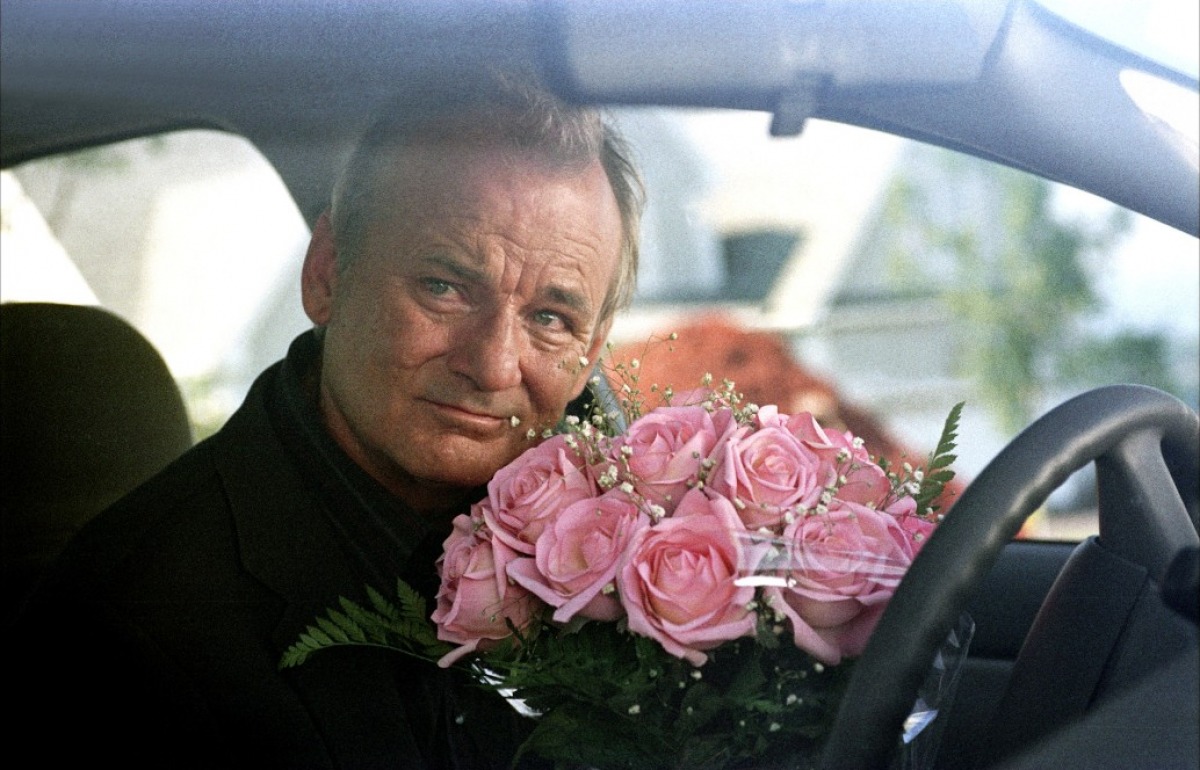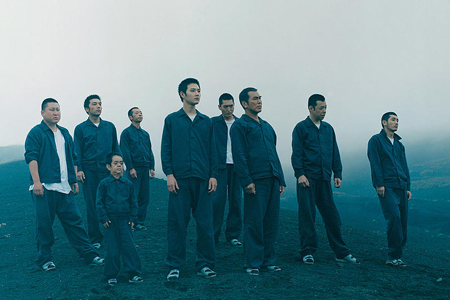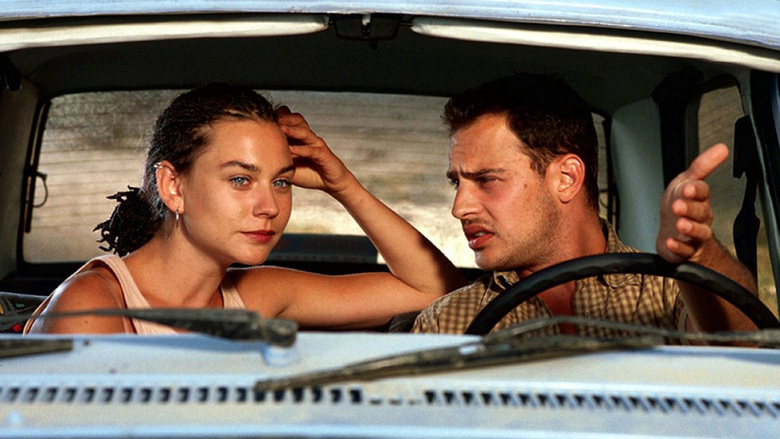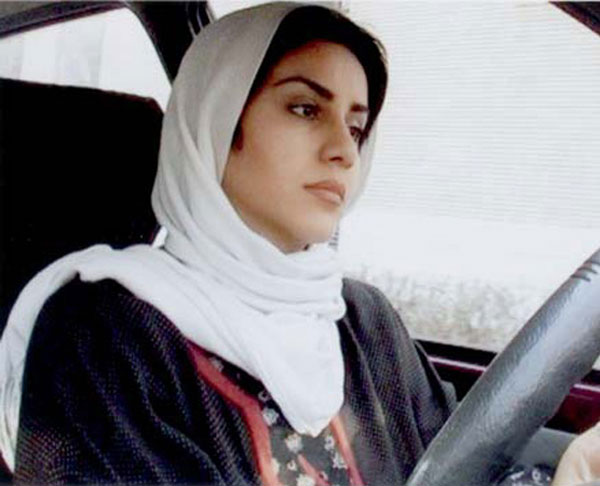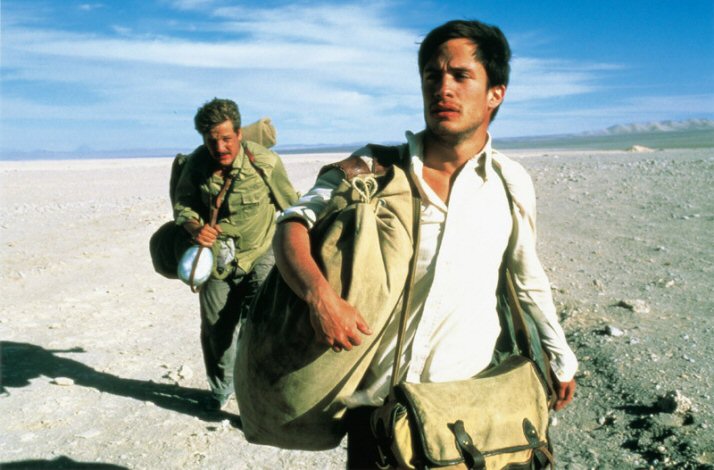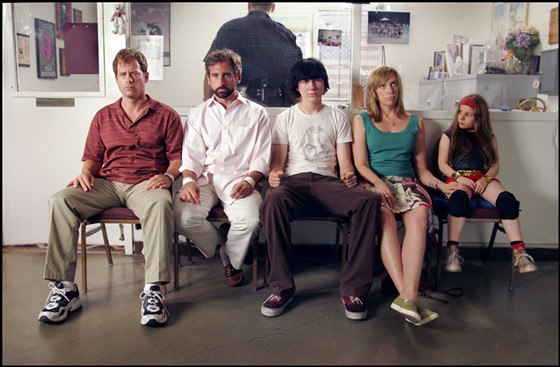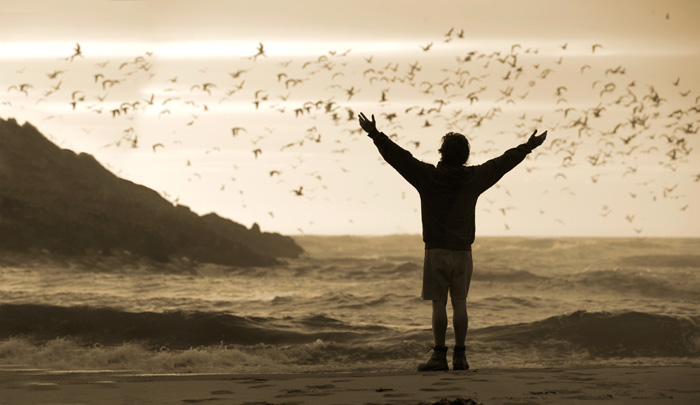8. Broken Flowers (Jim Jarmusch, 2005)
Don Johnston (Bill Murray, deadpan) is enjoying his retirement by spending his entire day sitting on his couch watching TV. He hardly goes out or does anything worthwhile. He is One day receives an anonymous letter from an alleged ex-girlfriend claiming that he had fathered a son with her who is now around 19 years old and has gone on a road trip to find him.
His neighbour and friend Winston (Jeffrey Wright, affable), sees this as an opportunity to get this lethargic old man out of his house and turn his life around. He not only coaxes Don to go on a road trip of his own and search for the mother of his son, but also tracks down each of his former lovers and prepares an elaborate dossier on each. Although reluctant to leave the comfort of his couch, Don eventually embarks on the journey to revisit his past, armed with a Winston’s meticulously planned itinerary and a CD of buoyant music.
The film is a typical road movie replete with all its tropes. But then it is also a Jim Jarmusch movie. He not only swaps the quintessential sleek convertible with slew of rented cars, and replaces the rock songs with quirky Ethiopian music, here the repetitiveness of Don’s life and his resistance to change is reflected in the use of limited stock shots; instead of vast awe-inspiring terrains, the landscape he drives through is without any variation, it is that of urban mundanness; there is no breeze of fresh air soothing the soul, instead this journey creates claustrophobia; like the lethargic Don, here even Jarmusch’s camera is lazy; in fact it is a road movie which sees very little movement.
As Don meets his ex-girlfriends, we see how the idealism of youth eventually gives way to the bitter realities of life where compromise becomes the key word to survive. And as themovie ends leaving a more humbled Don at the crossroads with Jarmusch’s camera hovering over in circles, there is a sense that it is not really a movie about the journey of this old man, but about the roads not taken by him. It leaves us as well as Don with more questions than answers. What if he had taken any of these relationships seriously? Where will this journey take him to now that the trip is over?
The film won the Grand Prix at the 2005 Cannes Film Festival and is one of the more commercially viable films of Jim Jarmusch.
7. 9 Souls (Toshiyaki Toyoda, 2003)
Nine prison inmates are put together in one cramped up cell. They are the detritus of the society, a motley group – Torakichi (Yoshio Harada), the leader of the group, has murdered his son; Michiru Kaneko (Ruyhei Matsuda) is convicted of patricide; Shiratori (Mame Yamada) a former doctor, had helped commit suicides; Kazuma (Koji Chihara) was a biker and is serving term for killing four of his friends, Inui (Takuji Suzuki), a mad bomber who threatened to blow up a bar; and then there is Fujio (Itsuji Itao) the pornographer; Kiyoshi (Kee) the pimp; ; Ushiyama (Genta Dairaku), the troublemaker; and Shishido (Onimaru) the delinquent. One day they get lucky and escape from the prison.
According to Toyoda he had taken inspiration from The Great Escape. But then, the escape itself is not what this film is all about. Made just three years after Brother, Where Art Thou?, this is another prison break film that turns into a road movie. Like the Coen Brothers film, the convicts escape from their cell and embark on a journey at the end of which is a promise of a treasure–a stash of counterfeit yen.
But that is where the similarity ends. These are not affable troublemakers but hardcore criminals. They are not chained together but are chained to their past. And these backstories become an important ingredient in the film that is a character study of nine individual men. It is story of what happens to these convicts once are back on the streets—their paranoia, their aspirations, their quest for redemption.
The first half is peppered with funny moments—there are pranks, men dressed in drags, unexpected reunions; but post interval that the rot, depicted in the first scene of the film, starts creeping in and smother the dreams of these men blocking all sources of hope. They can escape the prison but not their fate. This shift between slapstick and pathos and the occasional use of surrealism makes the story more poignant. Toyoda strikes an impeccable balance between the tragic and the comic, often heightening the first by using the second.
6. In July (Fatih Atkin, 2000)
The film begins in the middle. In the middle of a highway Daniel Bannier (Moritz Bleibtreu Run Lola Run) meets a rather shady looking Isa (Mehmet Kurtulus) and bums a ride to Istanbul. It’s a long journey and to break the monotony, Isa insists Daniel share with him the events that has landed him on this lonely highway.
Juli (Christiane Paul), a free-spirited street vendor is secretly in love with a shy, uptight high school physics teacher, Daniel. One day she sells an interesting story wrapped around a sun-shaped ring to this guy. She tells him that the piece of jewelry has a magical property and the true love of his life would have an exact same symbol on her. Of course she had an identical ring and it was all a ploy to get Daniel’s attention and affections. But as luck would have it he bumps into a stunning Turkish girl (Idil Uner) wearing a tee-shirt with the same symbol.
Convinced that she is his soul mate, he pursues her but she leaves him for someone she is supposed to meet under a bridge in Istanbul. But Daniel is not willing to give up. He borrows a car and embarks on a road trip from Hamburg to Turkey to win back the love of his life. On his way, he picks up a hitchhiker, who is none other than Juli. Fate throws them together in a car but it is five countries and multitudinous roadblocks later the two really come closer.
The film runs on the same vein as Rob Reiner’s The Sure Thing. There are clichés galore. But the movie still feels like a breath of fresh air. It is Fatih Atin’s treatment of the material in hand that makes a charming road-trip romance out of a simple and not-so-unconventional story.
5. Ten (Abbas Kiarostami, 2002)
The Iranian director once again blurs the line between fiction and non-fiction, between a conventional film and a documentary in this Palme d’Or nominated road movie. The whole action takes place inside a car and comprises of conversations (ten of them to be precise) between a woman cab driver and her various passengers. The topics range from personal identity, domesticity, religion, the legal system, parental control, sexuality, and most importantly the status of women in the male-dominated society.
The first passenger the driver picks up is her young son, who berates her for divorcing his father. The lady on the wheels, whom we are yet to see, tries to reason with the fuming boy who admonishes her for raising her voice in front of a man ( so what if it is her own son! ). The mini-tyrant is the prototype of the typical male in the fiercely patriarchal society of Iran.
When we finally get a glimpse of the woman at the receiving end, we find a pretty lady in her 30s, wearing lipstick and designer goggles, her head covered with a traditional scarf—she is the perfect example of modern women in Tehran who have a mind of their own, yet are stuck in a society which is still dominated by men. We will see the boy return to torment his mother quite a few times in the course of the drive. However, there are other passengers too. There is her older sister, a bride, a woman on her way to attend a prayer meet and also a prostitute. Each share their problems with the cabbie and in the process give us a rare opportunity to take a peek into the everyday realities of the land.
Kiarostami keeps the setup simple and there are just two digital video cameras fixed on the dashboard—one framing the driver, the other the passenger. Initially, Kiarostami wanted the pivotal character to be a female psychologist, who meets her patients in her car as her office is under renovation. He later replaced her with a woman cabbie driving through downtown Tehran, thus making the conversations more spontaneous and free willing.
But by keeping the entire action within the cab he provided the characters with a consulting room-like private space even when the car is moving through bustling traffic. In fact, in this movie the car is not just a mode of transport but acts as a reagent to the conversations that reveal the socio-political realities of modern-day Iran.
4. Y Tu Mamá También (Alfonso Cuaron, 2001)
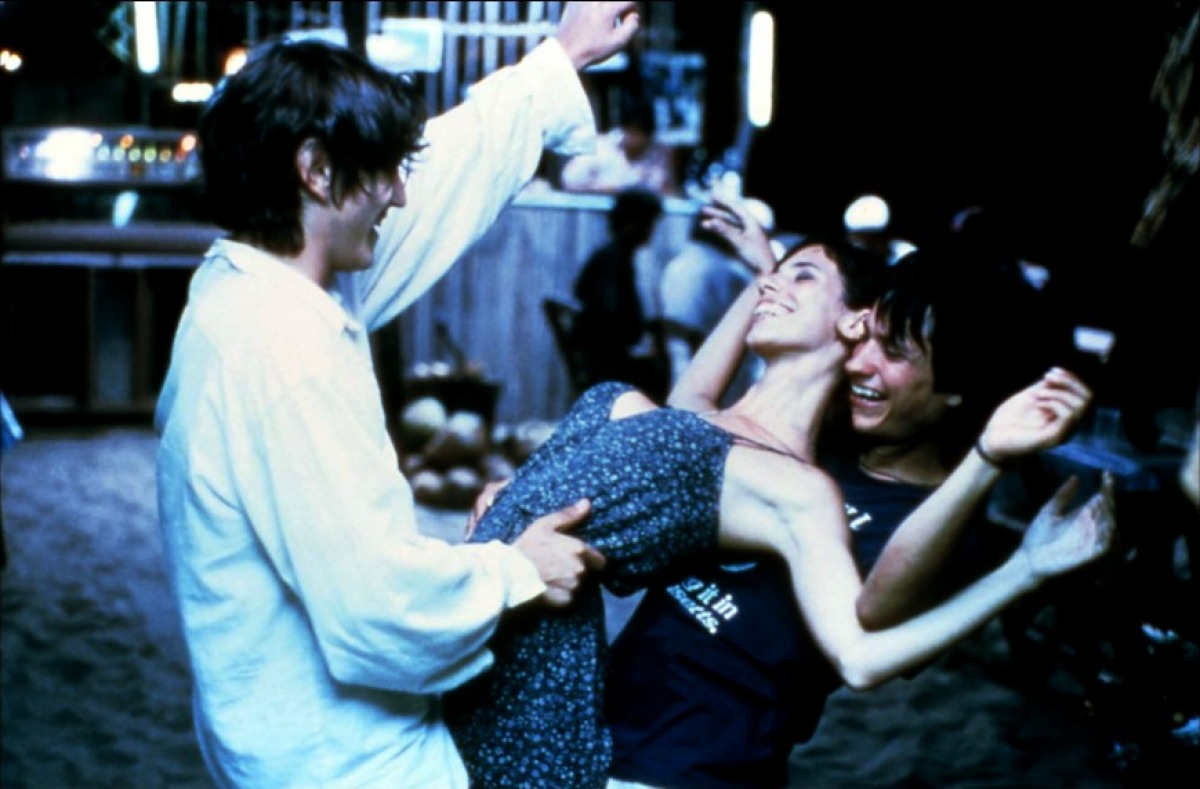
With their girlfriends gone on vacation, Julio (Gael García Bernal) and Tenoch (Diego Luna) are trying to keep themselves busy smoking pot, getting drunk and masturbating. One day at a wedding party the duo meet Luisa, Tenoch’s cousin’s seductive wife. The two drunk boys start flirting with her and ask her to join them on a road trip to Heaven’s Mouth, a fictitious beach they randomly come up with.
Initially Luisa refuses the offer. But eventually their hard selling pays off and Luisa, who suddenly comes to know that her husband has been unfaithful to her, decides to join the boys. On the road the two try to seduce Luisa who is far more experienced and eventually takes control. The story is that of a simple teenage fantasy—that of having a lush Mexican countryside?
However, the film goes beyond being just a stylishly-shot road movie sexual relationship with an older ‘experienced’ woman. What better vehicle to drive that fantasy home than a road movie with two guys taking turn to seduce the lady as they travel through the throbbing with high-voltage sex scenes. Apart from being a sex comedy, a buddy movie, it is also a bildungsroman, a commentary on contemporary socio-political scenario of Mexico, and a story that touches upon the transience of life and the inevitability of death.
While the two free-spirited boys on their single-minded pursuit for a ‘good life’ has turned blind to the political scenario of the country, Cuaron through his deft use of voiceovers, which is in the same vein as those in Godard’s Masculin féminin andBande à part, makes the audience aware of the turmoil his motherland is going through. He often lets his camera detach itself from the protagonists and focus on the other Mexico—the one plagued by poverty, inequality, injustice.
Also in Luisa we see a reflection of this Mexico—the seductive and benevolent motherland which is rotting from within with political corruption is spreading like a cancer.
3. The Motorcycle Diaries (Walter Salles, 2004)
This is true a story of a road trip from Argentine to Peru that one Ernesto Guevara de la Serna (Gael García Bernal) undertook way back in the spring of 1952 with the sole purpose to get closer to his roots, to discover as much of the real Latin America as he can. Along with him is his gregarious, womaniser friend Alberto Granado (Rodrigo De la Serna). They cross lakes and rivers and mountains and deserts—at times on their beloved motorbike La Poderosa (The Mighty One) and at times on foot or a truck or a steamer.
If the landscapes are stunning, the people the meet on their way are equally interesting and the 8,000-kilometre and five-month-long journey through the seaside town of Miramar, the ruins of Machu Picchu, the Atacama Desert and a leper colony on the Amazon, becomes instrumental in shaping the worldview of Ernesto—a young, asthmatic, naive, and shy medical student who became Che Guevera, the charismatic revolutionary and the face of Cuban Revolution.
It is a quintessential road movie where the journey becomes a life-changing experience for the protagonist and at one point Ernesto tells his friend: “I think of things in different ways….Something has changed in me.” But, Salles doesn’t stop at that. Apart from tracing the evolution of Ernesto, the film is also a chronicle of the South America prior to the Revolution and the military coups of the 1960’s and 70’s.
2. Little Miss Sunshine (Jonathan Dayton & Valerie Faris, 2006)
A classic dysfunctional American family goes on a road trip, alibi unwillingly. Richard Hoover (Greg Kinnear) is a struggling motivational speaker. His Nietzche-loving teenage nephew (Paul Dano) has taken a vow that he will not talk until he is old enough to be a fighter pilot. Richard’s father (Alan Arkin) has been thrown out of his retirement home for snorting heroin. That is not all; his brother-in-law (Steve Carell) is recovering from a failed suicide attempt.
From Proust to pornography, their interests are varied as is their eccentricities. But they live under the same roof and under the watchful eyes of Sheryl (Toni Collette), Richard’s wife and the quintessential mother figure who acts as the glue that holds the broken pieces of this family together. One thing common among this motley bunch is their love for little Olive (Abigail Breslin).
One day this cute, chubby, bespectacled seven-year-old gets a chance to participate at the Little Miss Sunshine pageant for which she has to travel from her home in Albuquerque, New Mexico, to Redondo Beach, California. When her mother Sheryl (Toni Collette) refuses to leave any of the members home, the entire Hoovers family packs themselves in a decrepit 1978 VW passenger van (which has a mind of its own) and embarks on a road trip across the Southwest.
Once in the van they are stuck together and have no alternative but to tolerate one another’s eccentricities. As they travel through the bleak desert highways bumping into one disaster after another, including the clutch of their vehicle breaking down and requiring all of them to team up and give it a push, each of them slowly learn to embrace the oddities of the other members (as well as life in general) and a feeling of solidarity develops. And by the time they reach the pageant, they become one cohesive unit, rallying behind their little Miss Sunshine.
The film, apart from being a modern take on the classic roadmovie, is also a social satire on the children’s beauty pageants mushrooming at every nook and corner of the country which not only sexualises the kids but also propagate a superficial idea of beauty among them. It is also a commentary on the fragile family unit of contemporary America.
1. Into the Wild (Sean Penn, 2007)
It is undoubtedly one of the landmark films in this genre. Although an adaptation of a Jon Krakauer book of the same name which in turn was based on an extraordinary true story, it is a film you’ll either hate or love.
Based on the life of 24-year-old Emory University graduate Chris McCandless, who one fine day donated his $25,000 grad-school fund to Oxfam, packed his bag and left his family and friends and everything he knew to feed his wanderlust, what makes the film an interesting watch is that although Penn stays true to the events that took place before the starved body (weighing just 66lbs) of the vagabond loner was found in a bus near Alaska’s Denali National Park, his approach is fresh.
While the book is an account of the tragic end of a kid who pursued his highly-romantic and unrealistic dream of leaving the society to find oneself and in the process weaving his own death-trap; the film celebrates his unconventional ways and his off-the-map journey.
Krakauer’s replete with interesting and well-researched data, interviews, back stories, character study, but Penn goes slow on the background information and plucks a full-blown McCandless from his college day and follows him as he hitchhikes across America and finally enters the Alaskan wilderness. Penn’s retelling of this adventure gone wrong is not an analytical piece but is a simple yet poignant story told from the perspective of the protagonist. It is a tragedy throbbing with life.
Author Bio: Ananya is a chief copy editor with a leading Mumbai-based tabloid. An obsessive-compulsive traveller and an occasional travel writer, she is also a film addict who watches every movie with an analytical eye. She is as enthusiastic to catch the first day show of a Bollywood blockbuster, as she is to attend four back-to-back screenings at a Buñuel or a Bela Tarr Retrospective. Although she is currently having a passionate fling with Lars von Trier films, Cary Grant comedies remain the true love of her life.
